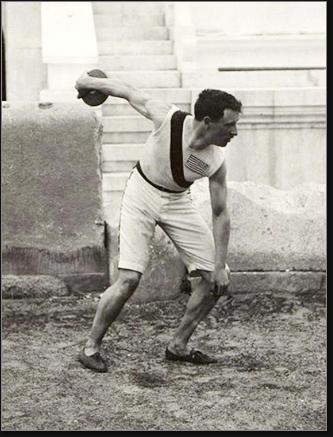Great Moments: Olympics
 Get Him to the Greeks Get Him to the Greeks
In 1895, the Greek government announced that it would revive the ancient Olympic Games in Athens in the spring of 1896. Prime Minister Demitrius Vikelas assumed the presidency of the International Olympic Committee, while French historian Pierre de Coubertin was the inspiration and guiding force behind the “modern” Olympics. Princeton history professor William Sloane, a friend and colleague of Coubertin, approached the Princeton track team and suggested they send a contingent to Athens. Team captain Robert Garrett (right), the scion of a wealthy Baltimore business family, agreed to finance the adventure.
Garrett was an exceptional athlete. He was primarily a shot putter for Princeton, but he also excelled in jumping events. Professor Sloane suggested that his skills lent themselves to the discus event. No one could locate a discus, so Garrett had a local blacksmith make one based on ancient drawings. It weighed almost 30 pounds—more than five times the actual weight—and was impossible to throw more than a few yards. A regulation discus was made of wood, around a metal hub with a metal rim.
Garrett and three teammates—sprinters Francis Lane and Herb Jamison, and pole vaulter Albert Tyler—arrived in Greece in late March. The Princetonians were accompanied by 23 other American athletes—none of whom did much in the way of practicing. On the day of the discus competition, Garrett was delighted when he saw an actual discus. It probably felt like a Frisbee compared to the iron model he’d left back in New Jersey. Then and there, he decided to enter the competition.
When Garrett observed the other throwers, who mimicked the style of the old Greek statues, he decided to try something a little different. He spun his body around a couple of times and then released the discus when it reached maximum momentum, similar to the technique he’d used throwing the hammer. Garrett’s first two tosses sailed into the crowd, scattering the spectators and generating derisive laughter. Garrett laughed, too. Perhaps his throwing style, which launched the discus fluttering end-over-end, was not such a good idea.
The third throw he got right. It spun beautifully through the air, surpassing the leading distance and eliciting a gasp from the audience as it touched down 95’ 8” away. The American had beaten them at their own classic game. Buoyed by his gold-medal throw, Garrett went on to win the shot put and finish second in the high jump and long jump, collecting two gold medals and a pair of silvers. Tyler won silver in the pole vault, Jamison won silver in the 400 meters and Lane won bronze in the 100 meters.
Garrett returned to the Olympics in 1900 in Paris. He was the favorite to win gold again in the shot put, but refused to compete in the finals because they were held on a Sunday. He was a devout Presbyterian. His qualifying distance was third-best, so the IOC decided to award him the bronze medal.
Garrett went on to enjoy a fruitful career in business and was an avid supporter of Princeton’s archaeology department. He passed away in 1961.
In 1984, as Los Angeles prepared to host the Summer Games, Olympic broadcast partner NBC produced a miniseries entitled The First Olympics: Athens 1896.
Garrett was portrayed by actor Hunt Block…a HARVARD man!
|